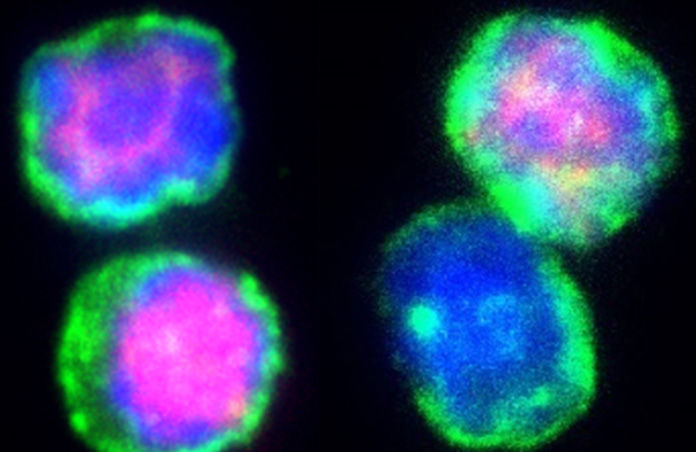Immune cells help fat deal with environmental challenges
Immunosuppressive regulatory T-cells play an important role in the functioning of adipose tissue
The number of obese people as well as those suffering from type 2 diabetes is increasing worldwide. Both disorders are associated with metabolic changes including amplified inflammatory responses in adipose tissue. “Previous studies have indicated that immunosuppressive regulatory T-cells – or Tregs for short – play an important role in these processes”, explains the leader of the study Dr. Carolin Daniel, group leader at the Institute for Diabetes Research (IDF) of the Helmholtz Zentrum München and a scientist in the German Center for Diabetes Research (DZD). “We now wanted to examine how these immune cells might support adipose function in more detail.”

T cells after a short-term cold treatment (left) and under control conditions (right). Immunofluorescent staining of the T cell marker CD3 (green), the Treg marker Foxp3 (red) and the nucleus (blue).
Helmholtz Zentrum München
In an experimental model, Daniel, together with co-first authors Dr. Stefanie Kälin and Maike Becker and colleagues, determined that the number of Tregs in adipose tissue increases in response to different environmental stimuli. These stimuli included a short-term cold treatment, stimulation of the sympathetic nervous system (β3-adrenoreceptors) or short-term high-caloric exposure. “All these stimuli supported those immunosuppressive cells directly in the adipose tissue”, says Becker.
Fat burning activated
The magnitude of the increase in Tregs differed depending on the type of adipose tissue: it was particularly pronounced in brown fat, somewhat weaker in subcutaneous fat and weakest in visceral fat. To investigate the specific function of Tregs, the researchers determined how gene expression changes in adipose tissue. Especially in brown fat, genes were activated that promote heat production (thermogenesis) as well as those that are used for the breakdown (lipolysis) and burning (oxidation) of fatty acids. Subsequent experiments revealed that the signalling molecules Stat6 und Pten play a vital role in this process.
“A better understanding of the immunological mechanisms involved in the target tissue will be critical for the development of personalized interventions in order to improve adipose tissue function during obesity and diabetes”, says the leader of the study Carolin Daniel. “Our experiments show for the first time that Tregs can support fat depots in dealing with environmental challenges.”
“Our findings highlight the complex interactions between our body and the environment. We have known for a while that hormones play a key role here – but now have to accept that immune cells may be just as important for a balanced metabolism”, comments Prof. Dr. Matthias Tschöp. He is the scientific director of the HDC at Helmholtz Zentrum München and holds the chair for metabolic diseases at the TUM. “These insights therefore help us tremendously with designing more efficient ways to therapeutically optimize when and how to store calories.”
Original publication
Other news from the department science

Get the life science industry in your inbox
By submitting this form you agree that LUMITOS AG will send you the newsletter(s) selected above by email. Your data will not be passed on to third parties. Your data will be stored and processed in accordance with our data protection regulations. LUMITOS may contact you by email for the purpose of advertising or market and opinion surveys. You can revoke your consent at any time without giving reasons to LUMITOS AG, Ernst-Augustin-Str. 2, 12489 Berlin, Germany or by e-mail at revoke@lumitos.com with effect for the future. In addition, each email contains a link to unsubscribe from the corresponding newsletter.






















































